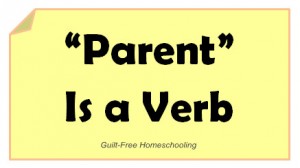Pick a problem from society in general today. Chances are it could be solved or could have been prevented by active parenting. “Parent” is a verb. “A parent” is a noun phrase used to describe either of the two persons responsible for a child’s presence on this planet, but “parent” should be considered as a command to action.
There are reasons children have parents — children need parents to protect them, guide them, and instruct them. Television, books, and movies are filled with scenarios where children solve their own problems, help each other out of difficult situations, and save the world from imminent destruction. It may get ratings, but it is not a true representation of real life.
When my children were of lower elementary age, a large department store chain was running a program for recycling and ecological awareness using the slogan, “Kids Saving the Earth.” I had personally ignored it as so much New Age melodrama until the day my daughter picked up one of the flyers in the store. As I told her to put it back, she clutched it dearly, proclaiming, “But Mom, it’s KIDS — SAVING the earth!” I immediately recognized the scope of this propaganda campaign: bypass the adults and recruit the children. We had a quick heart-to-heart discussion about how it is not children’s responsibility to save the earth; it is the responsibility of adults to be good stewards of the planet God has given us. Great relief seemed to overtake my child’s face as she realized she was no longer personally burdened by the slovenliness of uncaring, hedonistic adults.
Many times I sat with my children watching a “children’s program” or cartoon show on television, just so that I could point out to them the inconsistencies in the logic of the writers. One particular cartoon that my daughter wanted to watch featured darling little bunny-children who were indeed captivating to watch. However, when I caught the plot of any given episode, it invariably involved incapable idiot-adults who desperately needed their children to show them what to do next. I not-so-patiently waited for the end of that scene, muted the sound, and explained to my children how unreal the setting was. Then I banned them from watching that program again. My general rule for acceptability was: who is portrayed as being the leaders in society — children or adults? If the adults are portrayed as stupid and helpless and the children are the broad-shouldered geniuses who solve all life’s difficulties (in 23 minutes or less), you may not watch it. That blanket policy applied to TV, movies, and books, as well as friends’ attitudes, church youth group activities, and homeschool group activities.
Children desire limitations; boundaries are a form of security blanket for children. It works this way: you set a boundary, and the child pushes against the boundary to see if it is strong and true. If the boundary gives way, the child no longer knows where the boundary is and must keep pushing to see where the boundary will really stop. If the boundary does not move from where the parents set it, the child is secure in knowing he is safe inside. Occasionally, the child may test the boundary again just to be sure of its position, and the entire process is repeated. A firm boundary makes for a secure child; a vague or non-existent boundary leaves a child fearful and insecure. Think of boundaries as walls protecting from the big, uncertain world and the concept will be much easier to grasp. Set reasonable boundaries that allow freedom of movement within, and then watch for them to be tested. Your children are not challenging your authority; they are simply testing the strength and security of the wall.
When they test it again later on, they are still not challenging your authority as a parent, they are making sure you still love them. An unmovable boundary equals unmovable love from the parent. Be flexible enough to allow for an occasional open window in your wall; realize that you can temporarily relax a boundary without destroying it completely. The rare exception to a rule does not negate the entire rule.
Moms and Dads, it is your responsibility to educate your children, to teach them manners and civil behavior, to raise them up to be productive members of society and contributors to civilization. It is not for us to pawn our children off on self-proclaimed “professional” educators to lecture the tykes on good versus bad behavior: we are to teach by example. Our lives are to be the primary exhibits from which all observers may take note. We are to take the lead role in nurturing and discipling our children, not relegating it to babysitters, Sunday school teachers, grandparents, or anyone else. Parent is a verb.



 Guilt-Free Homeschooling is the creation of Carolyn Morrison and her daughter, Jennifer Leonhard. After serious disappointments with public school, Carolyn spent the next 11 years homeschooling her two children, from elementary to high school graduation and college admission. Refusing to force new homeschooling families to re-invent the wheel, Carolyn and Jennifer now share their encouragement, support, tips, and tricks, filling their blog with "all the answers we were looking for as a new-to-homeschooling family" and making this website a valuable resource for parents, not just a daily journal. Guilt-Free Homeschooling -- Equipping Parents for Homeschooling Success!
Guilt-Free Homeschooling is the creation of Carolyn Morrison and her daughter, Jennifer Leonhard. After serious disappointments with public school, Carolyn spent the next 11 years homeschooling her two children, from elementary to high school graduation and college admission. Refusing to force new homeschooling families to re-invent the wheel, Carolyn and Jennifer now share their encouragement, support, tips, and tricks, filling their blog with "all the answers we were looking for as a new-to-homeschooling family" and making this website a valuable resource for parents, not just a daily journal. Guilt-Free Homeschooling -- Equipping Parents for Homeschooling Success!

Speak Your Mind